Blow for UK workers as Vauxhall to be sold

General Motors has decided to sell its European arm, including Vauxhall, to Canadian car parts firm Magna, the German Chancellor announced today.
Angela Merkel told a news conference in Berlin the move was the outcome the German government had been working towards as it fought to preserve the firm's 25,000 jobs and four plants in Germany.
The decision is a blow to unions in the UK which have warned about possible job losses among 5,500 workers at Vauxhall's plants in Luton and Ellesmere Port if Magna was successful.
Sources had suggested earlier today that the GM board was set to decide not to go ahead with a sale, which would have eased fears of UK job losses.
But later speculation said GM had decided to sell its European arm to Magna, which is backed by Russia's Sberbank, a move confirmed by the German Chancellor.
Business minister Pat McFadden said: "Our objective throughout has been to get the best possible outcome for the Vauxhall workforce and the production plants in the UK.
"We have been in close contact with all parties throughout, including GM in the US and Europe, and all the potential bidders.
"Now GM has announced its preferred bidder is Magna. We will now continue our discussions with Magna: they have told us of their commitment to continuing production at both Ellesmere Port and Luton and we will work to make sure we get the best possible outcome for the UK."
Unite's joint general secretary Tony Woodley said: "The uncertainty surrounding the ownership of Vauxhall is now over, but the uncertainty surrounding the long-term future of Britain's plants will continue.
"One of the alternatives could have been the unthinkable position of liquidation.
"Nevertheless, with Magna as the new owner, we need to make sure that British plants and people are not treated disproportionately during the re-structuring that will take place. With that in mind, the union and the Government will no doubt continue to negotiate with Magna.
"We expect financial support from the UK Government for Magna to be dependent on the job and plant commitments given by the company."
Unions had been pressing GM not to sell its European business, believing this would be the best option for securing jobs in the UK.
Chancellor Merkel said "patience and resilience" during discussions had led to the sale decision being reached.
The decision has to be ratified by the Opel Trust, made up of representatives from GM, the German federal government and the German states that contain Opel plants, which is expected to announce its views later.
A rival offer for the business was made by Belgian investment group RHJ.
GM confirmed its board had recommended selling a majority stake of 55 per cent in Opel/Vauxhall, with employees holding a 10 per cent stake.
President and chief executive Fritz Henderson said: "Several key issues will be finalised over the next few weeks to secure the binding agreements, including the written support of the unions to support the deal with the necessary cost restructuring for viability and the finalisation of a definitive financing package from the German government.
"The definitive agreements should be ready to sign within a few weeks, with closing to follow within the next few months. Under the deal, Magna/Sberbank will purchase a 55 per cent stake in New Opel, GM will hold a 35 per cent stake and employees will be provided a 10 per cent stake.
"The hard work over the past two weeks to clarify open issues and resolve details in the German financial package brought GM and its board of directors to recommend Magna/Sberbank.
"We thank all parties involved in the intensive process of the last few months - especially the German government -for their continued support that enables this new venture. I'd also like to thank the Opel and Vauxhall customers for their continued loyalty. GM will continue to closely collaborate with Opel and Vauxhall to develop and produce more great cars, such as the new Insignia and the new Astra."
GM said the agreement will keep Opel/Vauxhall a fully integrated part of the firm's global product development organisation, allowing all parties to benefit from the exchange of technology and engineering resources."
"The new ownership structure constitutes a new lean, efficient and independent organisation for the Opel and Vauxhall brands. The current portfolio of Opel/Vauxhall cars and the models in the pipeline are a strong basis for future success," GM said in a statement.
John Smith, GM Group Vice President Business Development, added: "GM operates many joint ventures around the world and has proven in the past that this business model delivers the right balance of independence, innovation and synergies. All parties will work hard to close the deal as soon as possible."
The German government has been backing the joint bid from Magna and Russian bank Sberbank, offering almost £4 billion of finance.
Berlin championed the Magna bid because it involved guarantees not to shut down German plants, which employ 25,000 workers, but UK ministers have been pressing for a "commercial" decision to be made rather than one influenced by politics.
GM was considering the sale under moves to return to a firmer financial footing after emerging from US bankruptcy.
Subscribe to Independent Premium to bookmark this article
Want to bookmark your favourite articles and stories to read or reference later? Start your Independent Premium subscription today.

Join our commenting forum
Join thought-provoking conversations, follow other Independent readers and see their replies